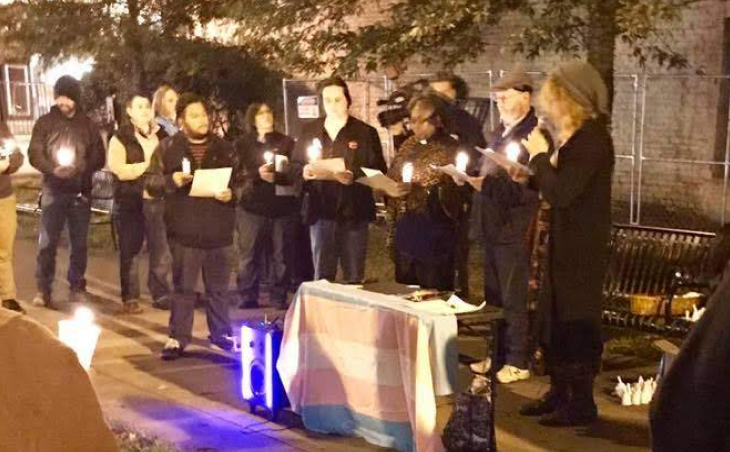
Ally Academy, Sisterhood Not Cisterhood
10 Things You Can Do To Show Up For Your Trans Loved Ones
The holidays are rolling in again — twinkly lights, sweater weather, and that one cousin who insists on “playing devil’s advocate” even though nobody asked. For many Two-Spirit, Trans, Intersex, and Gender-Expansive (2TIGE) folks, this season can feel like a mixed bag: joy, anxiety, celebration, and the ever-present question of whether family gatherings will feel welcoming or…something less than that.
If someone you love is 2TIGE, the way you show up can make the difference between a holiday that feels safe and affirming, or one that they spend silently bracing themselves. The good news? Being a supportive, thoughtful ally isn’t complicated. It just takes intention, humility, and a willingness to prioritize their comfort over anyone else’s convenience.
Here are ten ways to show up with real love, respect, and solidarity this holiday season — and beyond.
1. Use Their Name and Pronouns (Yes, Every Time!)
Affirming someone’s name and pronouns is the foundation of showing respect. If your loved one has shared theirs with you, use them consistently, even when you’re reminiscing about childhood stories or talking to relatives who “don’t get it yet.” If you’re unsure of their pronouns or how they introduce themselves these days, ask ahead of time instead of guessing.
Singular “they” is not new, confusing, or grammatically rebellious. You’ve used it your whole life. If you can say “Someone left their casserole on the counter,” you’re already doing it. It’s not about perfection; it’s about practice and commitment.
2. Check In Ahead of Time and Do Your Own Learning
Before the gathering, reach out and ask how they’re feeling about the holiday and what would help them feel supported. Maybe they want you to correct people gently on their pronouns. Maybe they want backup around certain relatives. Maybe they just want a neutral, judgment-free space to exist.
Whatever they share, honor it, and then take responsibility for your own education. If they seem open to talking, great. If not, don’t treat them like a walking encyclopedia of transness. The emotional labor of explaining themselves shouldn’t fall on them just because you’re curious. You can learn plenty from vetted resources (and you’ll find some below).
3. Don’t Ask Questions You Wouldn’t Ask a Cis Person
This one’s simple: if you wouldn’t ask a cisgender friend or family member a particular question, you shouldn’t ask your trans loved one either. Curiosity is normal, but bodies, medical decisions, and personal details are private. Questions like “Have you had surgery?” “What’s in your pants?” or “Which bathroom do you use?” are inappropriate, invasive, and irrelevant to who they are as a human being.
Respect their boundaries the same way you’d want yours respected.
4. Rethink Gendered Traditions
Families often have deeply ingrained gendered roles during the holidays: the women cook, the men watch football, or gifts are exchanged “by the boys” and “by the girls.” These traditions can feel alienating or painful for trans and non-binary relatives.
If your loved one is a trans man or trans woman, include them wholeheartedly in traditions that match their identity, versus ones assigned to them at birth. If they’re non-binary, talk with them about what feels comfortable or brainstorm new traditions together ahead of time. Safety and inclusion matter more than nostalgia.
5. Tell Old Stories the Right Way and Be Careful with Photos
Stories of childhood mischief and awkward middle-school moments can be sweet, but retelling them requires a little extra care. Use your loved one’s current name and pronouns when sharing memories. There’s no need to call in memories with language like “when you were a boy/girl”. These story still land without that kind of framing. Instead try something like “When you were younger”.
Photos are trickier. Some 2TIGE people enjoy looking back at old pictures; others find them dysphoric or painful. Always ask privately before pulling out old albums, passing around pre-transition pictures, or posting anything online. Even well-intentioned nostalgia can cross a boundary without meaning to.
6. Remember: Their Story Is Theirs to Share
Just because your loved one came out to you does not mean they’ve come out to everyone else in their life. They may not be out at work, school, church, or within certain parts of the family. Outing someone (even accidentally) can put them at risk socially, professionally, and in today’s climate, sometimes physically. Ie- just because you’re cool, doesn’t mean everyone else at the table is or will be.
Let people control their own narratives. If someone asks a question that you’re unsure how to navigate, try redirecting instead of revealing information that isn’t yours to disclose.
(Example: Your Trans loved one leaves the room, and suddenly Aunt Susan wants to know about their surgery status, you don’t need to give her a play by play, instead allow your Trans loved one to decide if/when they want to share that story and redirect the conversation to a favorite memory or anything else. If she or anyone else persists, it’s okay to be direct and let them know that that is not your story to share.)
7. Give Gifts That Celebrate Who They Are, Not Who You Assume They Should Be
Buying gifts for a newly out 2TIGE loved one doesn’t have to feel intimidating. The best strategy is the simplest: ask them what they want. Maybe they’re building a new wardrobe, exploring skincare or makeup for the first time, or trying out new hobbies or styles. They may also appreciate something fun, silly, comforting, or nostalgic (especially things they were denied growing up due to gendered expectations).
The goal isn’t to “get it perfect.” It’s to choose something that creates joy and says: I see you.
8. Stand Up to the Problematic Relative(s) – You Already Know Exactly Who We’re Talking About
Almost every holiday table has that one person who refuses to adjust, makes snide comments, misgenders people “on principle,” or wants to debate human rights like it’s fantasy football. Your loved one shouldn’t have to defend themselves alone.
Being an ally means stepping in; Calmly, confidently, and consistently. You don’t need to be confrontational to be firm. A simple “We’re using their correct name,” or “Hey, that’s not respectful,” is more powerful than you think. When allies speak up, 2TIGE people don’t always have to carry that burden themselves.
Allyship is a verb. Practicing it shows that you mean what you say.
9. Prioritize Their Comfort Over Your Discomfort
It’s okay if using new pronouns feels unfamiliar at first or if you’re nervous about correcting others. What’s not okay is putting the weight of your feelings onto your 2TIGE loved one. Their comfort, safety, and humanity are not optional because you feel awkward or uncertain.
If you care about them, truly care, then yes, stretch! Try new things. You’re going to get braver and things will get easier. That’s part of loving someone who needs you in their corner.
Their safety is more important than anyone else’s discomfort. Full stop.
10. When You Mess Up (And You Will), Fix It and Move Forward
No one expects perfection. What matters is how you respond. If you use the wrong pronoun or name, correct yourself quickly, apologize once, and move on. Don’t make a scene, spiral, or demand reassurance. Your loved one shouldn’t have to comfort you for a mistake you made.
The most respectful and authentic apology is changed behavior — not theatrics, not self-flagellation, and not turning your error into an entire holiday subplot.
After the Holidays: Keep Showing Up
Support doesn’t end when the decorations get boxed up. Keep checking in. Keep learning. Keep standing up when you need to. And most importantly, keep celebrating your loved one outside of crisis moments or visibility days. Trans people deserve ordinary joy, everyday safety, and people who stick around long after the holidays fade out.
Further Resources to Grow Your Allyship:
Trans Empowerment Project
Instagram • Facebook
Liberation Lab – TEP’s training platform
24/7 access to our self-paced allyship learning platform.
Trainings include:
Trans 101 • Sisterhood, Not Cisterhood • Supporters, Not Saviors • Centering Disabled BIPOC 2TIGE Lives
Sisterhood Not Cisterhood
A growing community and learning space for women (and our allies!) committed to practicing real, inclusive sisterhood.
Microgrants Donate to help us provide quarterly micro-grants. TEP’s micro-grants provide support for community members who need it the most.

From Nice to Necessary
When Charlie Kirk was killed, America’s public stage erupted in sympathy. Flags were lowered, NFL teams held moments of silence, talk show hosts wept on camera, and GoFundMe pages filled with donations for his wife and children.
But I couldn’t help asking: Where was this energy when George Floyd was murdered on camera? When 12-year-old Tamir Rice was shot in a park? When trans women are beaten, when immigrant families are torn apart, when Palestinian children are buried under rubble?
I’m a cis white woman, and I’ve learned the hard way that my silence — our silence — is not neutral. It’s deadly.
I am the COO of Trans Empowerment Project, a national nonprofit serving and led by trans folks, and I’m married to an Afro-Latino trans man. Many of the people in my life that I care about deeply face danger every day. And yet even in my own home, I’ve seen how my instinct to “keep the peace” causes harm.
Not long ago, my little brother came to visit us. He’s 11, and over the course of the week, made a few racist comments that he didn’t fully understand. My husband Jack asked me to talk to my mom about where he might be learning that language, and to encourage her to start her own anti-racism journey. I delayed and made excuses, mostly because I was afraid of upsetting her or pushing her away.
When Jack finally confronted me about my lack of action, he was devastated. To him, my hesitation looked like a choice to protect my mother’s comfort over his life experiences. He was right. I finally had the conversation, and it went better than I feared — but it shouldn’t have taken that long. My silence was not a kindness to anyone, and my unwillingness to rock the boat ended up hurting my partner and best friend.
That is the pattern white women must break. We tell ourselves we’re being “nice.” We don’t want to make family dinners awkward or lose friends over politics. We cry when we’re called out, shifting attention back to our hurt feelings instead of the harm we’ve allowed. We absorb stereotypes about Black women being “angry,” immigrants being “dangerous,” and trans women being “a threat” — sometimes even convincing ourselves that standing aside is neutrality.
It isn’t. It’s complicity.
Right now, nearly 1,000 anti-trans bills have been introduced across the U.S. ICE raids are terrorizing families. Politicians openly float “nihilistic violent extremist” labels to criminalize transgender advocacy. Abroad, genocides are unfolding while Americans scroll past in silence. And still, when a powerful white man dies, tears flow while violence against marginalized communities barely registers.
I believe white women could change this trajectory — quickly. Women are the majority in this country. We are the backbone of childcare, healthcare, and education. And if white women collectively refused to excuse bigotry in our families, book clubs, workplaces, and churches, the culture would shift. Imagine if we showed up to stomp out racism and transphobia as fast as we lined up to knit pink pussy hats. We would be unstoppable.
That’s why I wrote From Nice to Necessary: A Starter’s Guide for White Women Who Want to Cause Good Trouble. It’s not about shame; it’s about responsibility. The guide offers stories, tools, and steps for moving beyond “niceness” into action. It’s meant to be read with friends, neighbors, parent groups, colleagues — anywhere silence has been the norm. Because it’s time we stop choosing peace at the dinner table over justice in the streets.
If you’re a white woman reading this, here’s my ask: Don’t let this moment pass. Download the guide. Gather your people. Share it widely. Have the conversations you’ve been avoiding. And then take action — donate, fundraise, volunteer, protest, protect.
History won’t remember our good intentions. It will remember whether we stood up or stayed quiet, and right now, the silence is deafening.

Sisterhood Not Cisterhood
By: Heather Knoxville (she/they)
In a world that too often echoes with division, Trans Empowerment Project (TEP) hopes to stand as a beacon of unity and love, especially through our transformative “Sisterhood Not Cisterhood” program. As we encourage folks to join our newest campaign, “Louder With Love,” it’s a poignant time to reflect on what it means to truly celebrate womanhood in all its diversity.
As I personally reflect on “Louder With Love” and the growth of the Sisterhood Not Cisterhood program, I am reminded of the many women I’ve interacted with at conferences and workshops – women who are learning how to be better, more intersectional allies; women who are finding themselves, claiming their power, and learning how to lead (and when to follow other leaders); women who are getting out of their comfort zones to try and make the world a better place, even with everything else they carry.
These are trans women, cis women, BIPOC women, disabled women, white women – all coming together to learn from one another and to build community together. I am in awe of these women, and it has been a pleasure to teach and learn alongside them. Never have I seen “sisterhood” exemplified more than in these spaces, where egos are put aside, and minds are open to learning and, more importantly, hearing.
The Power of Inclusive Sisterhood
At the heart of our Sisterhood Not Cisterhood program is a simple yet profound belief: every woman deserves recognition, celebration, and empowerment. Here’s why inclusive sisterhood is not just important but essential:
- Unity in Diversity: Our strength lies not in our sameness but in our diversity. By embracing every woman’s unique experiences and perspectives, we build a more resilient and compassionate community.
- Breaking Barriers: Historically marginalized groups, including 2TIGE ( 2 Spirit, Trans, Intersex, and Gender Expansive), disabled, and BIPOC communities, have faced systemic barriers to empowerment and recognition. Inclusive sisterhood seeks to dismantle these barriers, ensuring that every woman has the opportunity to thrive.
- A Larger Community: When we stand together, the community of women isn’t just big; it’s boundless. United, there’s no limit to the change we can enact and the futures we can build.
This actually reminds me of a t-shirt my husband bought for me that says, “Our world needs women who are dangerously awake, fully alive, and unified in heart and purpose.” That rings so true for me, especially right now. Our world feels like it’s on fire, but if we wake up and work together instead of letting ourselves be divided, we can build a world where everyone thrives – that is the purpose we need to be unified under, and we need to be loud about it.
(BTW, you can get one of those t-shirts for yourself from Mahogany Mommies…no affiliation with us, they just make some really cool stuff)
Louder With Love: Why It Matters
The “Louder With Love” campaign is more than a slogan; it’s a call to action. In an age where dividing lines are drawn too quickly and hate can spread with a click, choosing love is a revolutionary act. Here’s how we can all get “Louder With Love”:
- Drown Out Hate: Every act of love, big or small, has the power to silence messages of hate. Whether it’s through words of support, acts of kindness, or standing up for one another, love is our most potent weapon. Perform a random act of kindness today – and remember to check on your 2TIGE and BIPOC friends; this world is heavy right now.
- Disrupt the Doom Scroll: In the relentless cycle of negative news and social media toxicity, it’s easy to feel despair. But by amplifying positive stories, achievements, and moments of unity, we can change the narrative together. Make a positive post of your own using our #LouderWithLove hashtag and challenge 3 friends to do the same, or use our customizable social media toolkit for sample posts.
- Build a Future on Love: Our dreams for the future are built on the foundation we lay today. By fostering an environment of love and support, we make it possible for every woman to achieve her full potential.
Together, We Are Unstoppable
The message of “Sisterhood Not Cisterhood” and the “Louder With Love” campaign is clear: our love for each other must be louder, stronger, and more enduring than any forces that seek to divide us. It’s a reminder that together, we’re not just a community; we’re a force for change.
As members of the TEP family, whether you’ve been around for a while or you’re just getting here, you’re part of this beautiful, ongoing movement of empowerment and unity. Let’s stand together, louder with love, and show the world the incredible power of inclusivity and unwavering solidarity.
Looking ahead to a year that is sure to be fraught with tension and repeated attempts at dividing our country, I’m filled with hope and determination because I’ve seen firsthand how collective efforts can weave a tapestry of support and belonging. My pledge this year is simple, but resolute: I will be louder with love, in words and in action – and I hope you’ll join me.
Together, there’s no doubt in my mind that we can build a future where every person, in all their unique glory, is celebrated and empowered to thrive.
Learn more about #LouderWithLove




